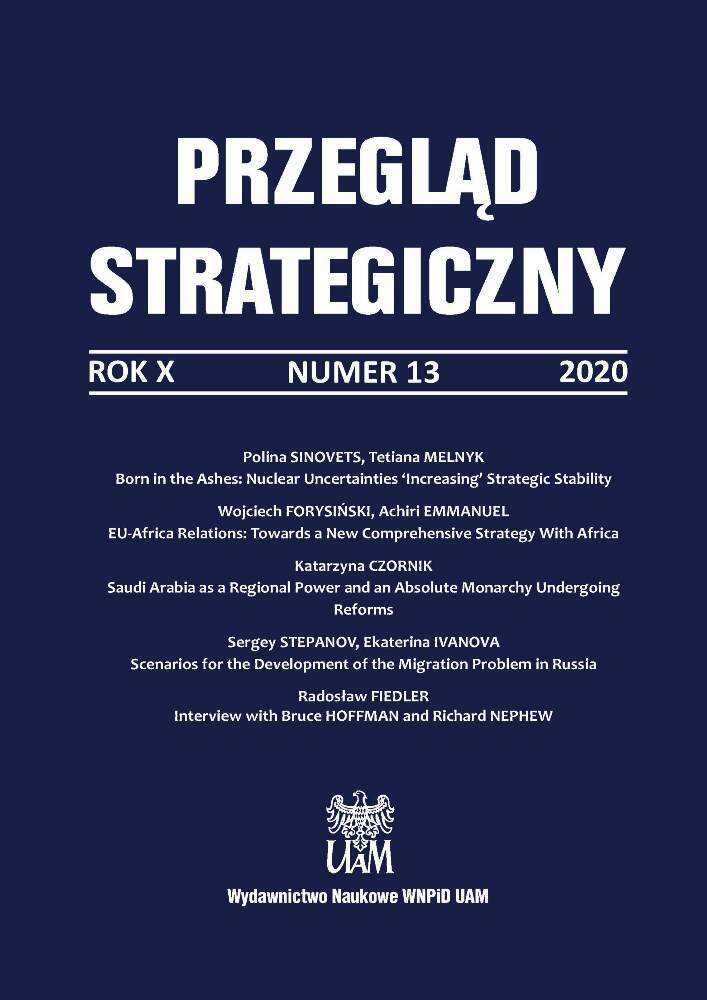Abstract
The article is devoted to the impact of migration processes on public opinion and possible solutions to the migration problem in modern Russia. An analysis and comparison of the results of sociological surveys conducted by various sociological agencies over the past five years has made it possible to identify the most vulnerable points in interethnic relations. Speaking about the future prospects of Russian migration policy, the authors offer scenarios for the development of the migration problem in Russia. To study the experience of the organization, as well as to determine the specific features of the functioning of the migration process, comparative methods are used to identify the main ways of regulating the migration policy in Russia and to compare this practice with international experience. The generalization method is also used, allowing the authors to identify common properties and characteristics of the objects of study by moving from a particular or less general concept and judgment to a more general concept or judgment within the framework of this study. The methods of induction and deduction are widely used in academic research. Thanks to these methods, researchers have the opportunity to examine certain processes in detail, build logical relationships and sequences, and identify patterns. The use of induction made it possible to derive general propositions from a series of particular statements and isolated facts based on data from past experience.
References
Burda M., Gerasimova I., Ochacha M. (2019), Migration policy as instrument of ensuring national state security, “Przegląd Strategiczny”, No. 12, https://doi.org/10.14746/ps.2019.1.12.
Demograficheskie vyzovy Rossii (2018), Center for strategic research, Moscow, https://www.csr.ru/news/demograficheskie-vyzovy-rossii/ (01.04.2020).
Demographic modernization of Russia, 1900–2000 (2006), (ed.) A. G. Vishnevsky, Novoye izdatel’stvo, Moscow.
Federal’ny’j zakon ot 01.05.2016 № 119-FZ – “Ob osobennostyax predostavleniya grazhdanam zemel’ny’x uchastkov, naxodyashhixsya v gosudarstvennoj ili municipal’noj sobstvennosti i raspolozhenny’x na territoriyax sub’ektov Rossijskoj Federacii, vxodyashhix v sostav Dal’nevostochnogo federal’nogo okruga, i o vnesenii izmenenij v otdel’ny’e zakonodatel’ny’e akty’ Rossijskoj Federacii.”
Grigoryeva K. S., Mukomel V. I. (2014), Migranty i rossiyane na rynke truda: usloviya, rezhim truda, zarabotnaya plata, at: Migranty, migrantofobii i migratsionnaya politika, The Moscow bureau on human rights, Moscow.
International Migration 2019 (2019), in: Report by UN Department of Economic and Social Affairs Population Division, New York, https://www.un.org/en/development/desa/population/migration/publications/migrationreport/docs/InternationalMigration2019_Report.pdf (03.04.2020).
Ivakhnyuk I. V. (2011), Perspektivy migratsionnoy politiki Rossii: vybor vernogo puti, MAKS Press, Moscow.
Ivanova E. A. (2013), Vozmozhnosti i perspektivy noveyshikh informatsionnykh tekhnologiy v regulirovanii migratsionnoy politiki Rossiyskoy Federatsii, RUDN University, Moscow.
Koncepsiya gosudarstvennoy migratsionnoy politiki Rossijskoj Federatsii na period do 2025 goda, http://www.kremlin.ru/acts/15635 (25.04.2020).
Kozevnikova G. V., Shehovtsov A. V. (2009), Radikalny russkiy nacionalizm: strukuri, idei, lica, Centr „Sova”, Moscow.
Malysheva A. Yu. (2008), Trudovaya migratsiya v stolichnom megapolise i mekhanizmy yeye regulirovaniya, Moscow.
Migration and the 2030 Agenda. A Guide for Practitioners (2018), International Organization for Migration, Geneva, https://publications.iom.int/books/migration-and-2030-agenda-guide-practitioners (20.07.2020).
Migratsionnaya politika: diagnostika, vizovi, predlozenia (2018), Center Stratedicheskih Razrabotok, https://www.csr.ru/upload/iblock/e4b/e4b41353159a34f48cddd3c1effb1e41.pdf (20.07.2020).
Monitoring ksenofobskih nastroenij v 2019 godu, https://www.levada.ru/2019/09/18/monitoring-ksenofobskih-nastroenij-2/ (01.12.2019).
Moscow Mayor says no to more mosques in the city, “Russia Today”, 01.03.2003, https://www.rt.com/russia/moscow-mayor-says-no-to-more-mosques-in-the-city-669/ (01.12.2019).
Mukomel V. I. (1997), Pravovyye osnovy i praktika regulirovaniya migratsii v subyektakh Federatsii, „Migratsiya”, Vol. 3.
Mukomel V. I., Pain E. A. (2006), Nuzhny’ li immigranty’ rossijskomu obshhestvu, Fond “Liberal’naya missiya”, Moscow.
Nazarova Yu. A. (2010), Vneshniye migranty v Moskve i ikh vliyaniye na sovremennyye sotsial’nyye protsessy, Moscow.
Osadchaya G. I., Yudina T. N. (2009), Migratsionnyye protsessy i migratsionnaya politika Moskvy, RGSU, Moscow.
Postsovetskiye transformatsii: otrazheniye v migratsiyakh (2009), (eds.) Zh. A. Zayonchkovskaja, G. S. Vitkovskaja, Tsentr migratsionnykh issledovaniy, Institut narodnokhozyaystvennogo prognozirovaniya RAN, IT „Adamant”, Moscow.
Programma “Dalnevostochnyy gektar”, https://надальнийвосток.рф/ (23.07.2020).
Russian Public Opinion Research Centre (VСIOM), Muscovites worried about migrants – survey, https://wciom.com/index.php?id=63&uid=776 (01.02.2020).
Rybakovskiy L. L. (2009), Transformatsiya migratsionnykh protsessov na postsovetskom prostranstve, Moscow.
Rybakovskiy L. L. (2014), 20 let depopulyatsii v Rossii, Econ-Inform., Moscow.
Shilov N. V. (2016), Migrant phobia as a risk factor for the occurrence of interethnic conflicts, “Regionology Journal”, No. 4.
Shkel Т. (2012), Arifmetika migratsii, “Rossiyskaya gazeta”, 22.03.2012, http://www.rg.ru/2012/03/22/migranty.html (15.05.2017).
Tishkov V. A. (1997), Ocherki teorii i politiki etnichnosti v Rossii, Moscow.
Vakulenko Y., Leukhin R. (2016), Diskriminiruyutsya li inostrannyye rabotniki na rossiyskom rynke truda?, „Ekonomicheskaya politika”, Vol. 11(1).
Vendina O. I. (2009), Kul’turnoye raznoobraziye i «pobochnyye» effekty etnokul’turnoy politiki v Moskve, „Immigranty v Moskve” (ed.) Zh. A. Zayonchkovskaya, Moscow.
Vishnevskiy A. G., Denisenko M. B., Mkrtchyan N. V., Mukomel V. I., Tyuryukanova Ye. V. (2011), Tolerantnost kak faktor protivodeystviya ksenofobii: upravleniye riskami ksenofobii v obshchestve riska, Academic Publishing, Moscow.
World Population Prospect: The Revision 2004. WPP 2004 interim results, http://www.wpp.com/wpp/press/press/default.htm?guid=%7b8cdaec5e-ad1e-4646-bc99-63c82aab5c21%7d (03.04.2020).
Yezhemesyachnyy monitoring sotsial’no-ekonomicheskogo polozheniya i samochuvstviya naseleniya sentiabr 2019, Rossiyskaya akademiya narodnogo khozyaystva i gosudarstvennoy sluzhby (RANKHIGS), https://www.ranepa.ru/images/insap/insap/Monitoring_16_09_2019.pdf (03.03.2020).
Yudina N., Alperovich V. (2015), Calm Before the Storm? Xenophobia and Radical Nationalism in Russia, and Efforts to Counteract Them in 2014, http://www.sova-center.ru/en/xenophobia/reports-analyses/2015/04/d31818 (01.04.2020).
Yudina T. N. (2006), Sotsiologiya migratsii, Akademicheskiy Proyekt, Moscow.
Zaslavskaya T. I. (1970), Migration of the rural population, Mysl’, Moscow.
Zayonchkovskaya Zh. A. (2009), Immigranty’ v Moskve, Institut Kennana, “Tri kvadrata”, Moscow.
Zayonchkovskaya Zh. A. (2010), Migraciya – e’to dusha Rossii, http://academ.info/news/15340 (01.04.2020).
Zayonchkovskaya Zh. A., Tyuryukanova Ye. V. (2010), Migratsiya i demograficheskiy krizis v Rossii, Moscow.

